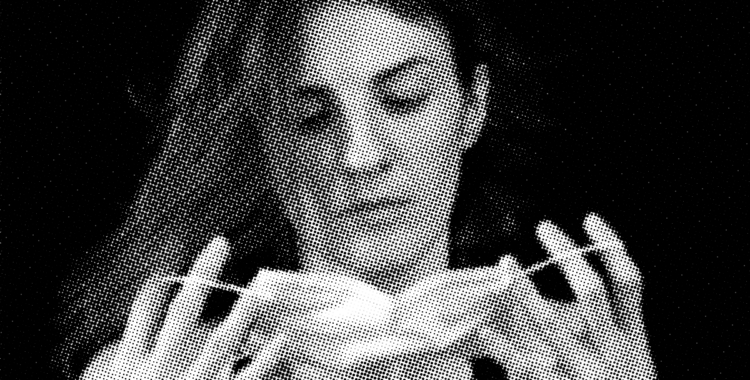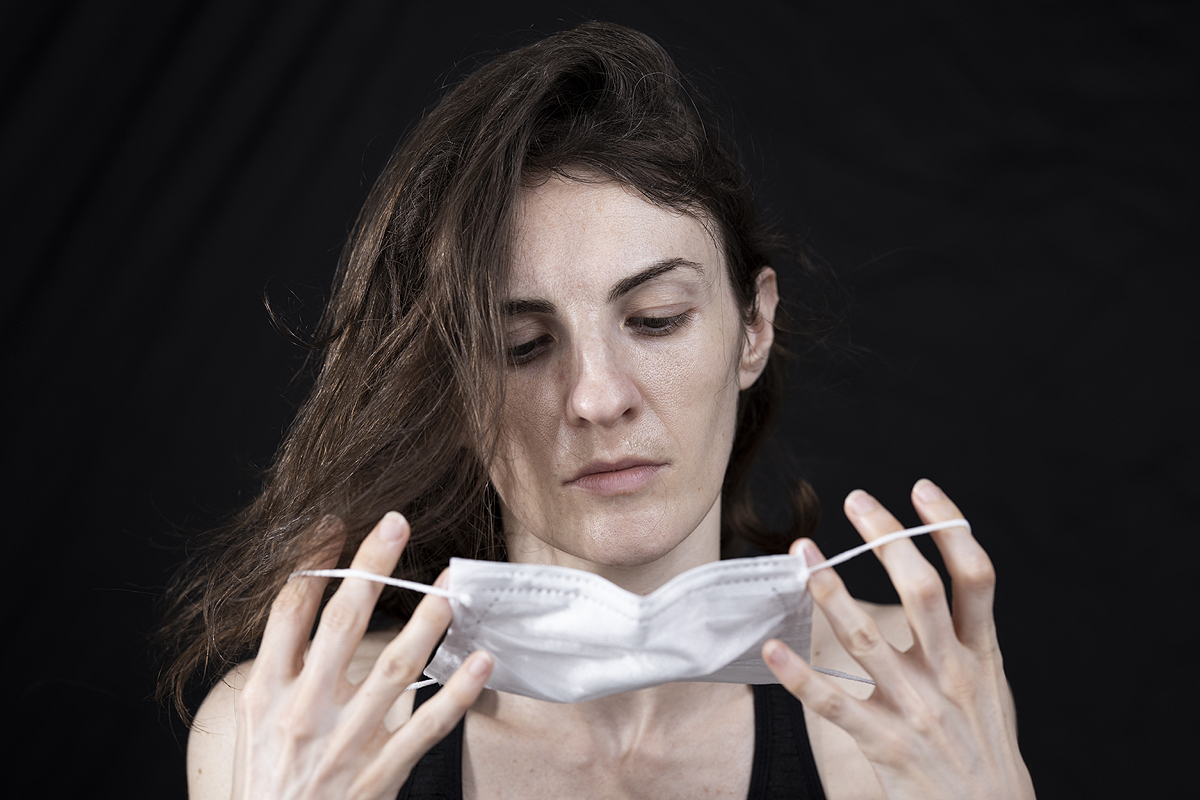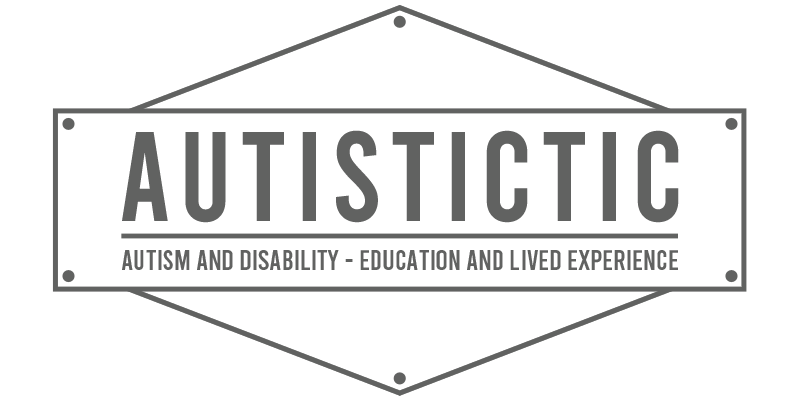HOME » BLOG » I CAN’T WEAR A MASK

I CAN’T WEAR A MASK

“I can’t wear a mask.”
Five words. An objective fact. My reality.
What people seem to hear when I say these words:
“I go out amongst other people without wearing a face mask, risk getting infected with COVID, risk infecting others with COVID, because I just don’t care!”
What I am actually saying when I say these words:
“I can’t wear a mask.”
PRO-MASKERS VS. ANTI-MASKERS IS ALL WE HEAR
There are three groups of people in the mask-or-no-mask-fight that is currently going on amongst the COVID-19 pandemic. But only two of them are being heard: The anti-maskers and the pro-maskers.
Anti-maskers are people who can wear face masks, but don’t want to and make up all sorts of claims to justify not wearing them. They also refuse to take other infection prevention measures. Social distancing is especially scoffed at by these sorts of people.
They claim that COVID-19 doesn’t even exist, is not as widespread or dangerous as the data tells us, that face masks don’t actually protect from COVID-19 at all, or that making face masks mandatory infringes on their rights.
All of their claims are bullshit of course. And harmful, because they are being used as justifications to not take protective measures, which increases the spread of COVID-19 and puts everyone at risk. Luckily, factual data and science won in many places, and face masks have finally been made mandatory.
So as a last resort to avoid having to wear a mask, anti-maskers took to making disgusting false claims of medical conditions and disabilities that “make them exempt” from the mandatory face mask rules. Some even invoke the ADA for their false claims. They create, sell, and use fake disability and medical IDs to show when someone tries to make them wear a mask. And they even go as far as publically bragging about doing this.
Naturally, such harmful attitudes and behavior create opposition. People who can take protective measures, but choose not to, put themselves and everyone else at risk of COVID-19 infection, severe illness, and death. That’s not a joke.
That’s where pro-maskers come in. Pro-maskers are the people who understand the need for face masks and support their use in general, as well as making them mandatory. They are rightfully angry at anti-maskers. They are rightfully pushing back. They are calling out anti-masker’s false claims of medical conditions and disabilities. That is a good thing – to force anti-maskers to wear face masks, but also to protect actual disabled people whom laws such as the ADA are meant to protect.
But recently pro-maskers pushing back against anti-masker’s false claims of medical conditions and disabilities has turned into something else. People are now not only pushing back against lying anti-maskers. No, now people claim that there is no such thing as a valid reason for why someone can’t wear a mask. Pro-maskers are now calling anyone who has a legitimate reason for why they can’t wear a mask a liar.
This tweet showed up on my Twitter timeline today. It seemed like a genuine question, and so I answered it. Only to discover that the replies are full of pro-maskers being horribly ableist:
“What kind of medical condition prevents someone from wearing a mask?”
Here are 5 of countless similar replies to that tweet:
“Masks don’t actually reduce breathing efficiency afaik.”
“Cuntitis”
“Obdurate arrogant stupidity”
“Total idiocy…”
“Narcissism”
This is what people who struggle with face masks are confronted with daily now.
And that brings us to our third, erased, forgotten, silenced, harmed group of people: people who want to wear masks, but legitimately can’t.
Pro-maskers call people who actually can’t wear masks liars. They insult them. They mock them. They attack them. People who legitimately struggle with face masks can now not talk about that anymore without getting attacked. They can’t seek or get support, because whenever they out themselves as someone who can’t wear a mask, they get attacked.
What I need people to understand is that all of this is equally wrong.
It’s wrong to be able to wear a mask but to choose not to.
It’s wrong to lie about having a medical condition or disability.
It’s wrong to attack people who legitimately struggle with wearing a mask.
And because both harmful anti-maskers and harmful pro-maskers are very loud, we don’t hear enough from those people who want to wear masks but legitimately struggle. That’s why I decided to write this. I am here to speak up for myself as a part of that third group, and to make sure that our voices are heard. That we get the support we need to survive this pandemic. We exist. We matter.
I can’t wear a mask.
WHAT “I CAN’T WEAR A MASK.” MEANS FOR ME
Of course “I can’t wear a mask.” is a very short sentence that doesn’t fully explain all of my circumstances. So let me explain what this sentence means for me.
I have allergies, asthma, and have had multiple bouts of bronchitis and pneumonia in my life. I am also autistic and have sensory processing disorder. I have severe generalized anxiety. I have migraines. I have a list of other diagnoses, as well as still undiagnosed issues. Finally, I am poor.
For me, this has four consequences regarding mask-wearing:
1. I am in the high-risk group for COVID-19 complications. So I have to try not to get infected.
2. I often have breathing difficulties and neurological issues already a mask. An FFP3 mask restricts my breathing so much that when I wear it, I get a headache, blurry vision, dizziness, nausea, and eventually faint if I don’t take the mask off in time. Or I get a migraine. So far I haven’t been able to wear my FFP3 mask for more than about 5 minutes while able to cope and then recover, and about 10 minutes with nearly fainting.
3. I cannot safely wear anything less than an FFP3 mask, because anything less doesn’t securely protect me from infection with COVID-19. Yes, theoretically I can breathe better the thinner the masks, so I can wear them longer – but the thinner the mask, the less protection it offers, so it’s simply not an option. Face shields, surgical masks, home-made cloth masks, vog masks, etc…all the non-FFP3 options I know about would allow me to wear them longer, but don’t reliably protect me.
4. I can’t afford to buy multiple masks in the hopes to maybe one day find an FFP3 option that is accessible to me with my disabilities.
So I am at high risk for COVID-19 complications, I need to wear a mask, I want to wear a mask, I can’t go out safely without an adequate mask (except for where it’s safe to be without one), and I can’t safely wear an adequate mask for more than a few minutes.
This is my reality.
It doesn’t matter if you believe it or not.
It doesn’t matter if you have XYZ but you can wear a mask.
It doesn’t matter if your Mom, friend, uncle, neighbor, or postman has XYZ but they can wear a mask.
It doesn’t matter if you are a medical professional.
It doesn’t matter what your circumstances are.
It doesn’t matter what anyone else’s circumstances are.
My circumstances are my circumstances and my circumstances make it so that I can’t wear a mask.
SO WHAT DO I DO GIVEN THAT I CAN’T WEAR A MASK?
So do I just go out and about without a mask, into stores and restaurant, to the doctor, to the movies and to concerts, to the beach, amongst other people, risking getting infected and infecting others like the pro-maskers who keep attacking me with their baseless assumptions believe? No. I don’t.
How do I solve my mask problem then? I don’t, really. I work around it as best as I can, accepting the negative consequences it has for my life. Here is a list of the infection prevention steps I take:
I HAVE MOSTLY STAYED HOME SINCE FEBRUARY 2020
I leave our apartment to take out the trash, do the laundry, and get the mail.
One time since February I went to the post office to drop off a package. I wore my FFP3 mask from when I left our apartment to when I stepped back into our apartment. Luckily the post office is next door so this took me about 3 minutes. It was doable but I was dizzy after and had to recover.
One time since February I went to the doctor because I absolutely had to. I waited outside so I didn’t have to wear my mask. I put on my FFP3 mask before entering the office and wore it inside for as long as I could. I have fainted a lot in my life so I know the warning signs. When I noticed I was getting too dizzy, I stepped back outside to take mask-free breaths multiple times during my appointment. This was doable, given I am still alive – but it was severely distressing, as well as physically taxing, requiring several days of recovery after. So it’s not something I can do daily or even weekly.
If I ever come across another person while outside, I stay away from them. I make sure there’s at least 2 meters distance between us. If I can’t ensure that, I go another way.
MY HUSBAND IS MY ONLY IN PERSON SOCIAL CONTACT – AND EVEN WE DISTANCE
I live with my husband. He can wear a mask and he does. He is not as vigilant or worried as I am, but I make sure that he takes it seriously and wears his mask whenever he has contact with other people or is in an enclosed space. He is my only in-person social contact.
I am distancing even from my husband. We don’t kiss or hug. We sleep feet to heads in our shared bed. We don’t share utensils, dishes, soap, toothpaste, towels, etc. He is the one who cooks, and he does so while wearing a mask through the entire process (prepping, cooking, and serving). He washes and disinfects his hands before, during, and after. We stand 2 meters apart when we talk. In short: we do what we can to ensure our droplets don’t get onto the other person.
I have had a couple of “window talks” with my Mom. She comes by and stands outside, I stay inside, standing upstairs at an open window. That’s how we “meet”. It’s safe for both of us without wearing masks.
I haven’t seen my baby niece in half a year. My second niece will be born later this year. I probably won’t see her at all.
My only other social contacts happen online where nobody needs to wear a mask.
I HAVE GIVEN UP ALL MY IN PERSON SUPPORTS
I am disabled and chronically ill. Usually, I get official supports for this. Because I can’t wear a mask, and I don’t want to put myself or others at risk, I have given up all my in-person supports since February. I no longer go to my occupational therapy, my cleaner no longer comes, I no longer get in-person support from my carer. This has a huge negative effect on my physical and mental wellbeing, but I don’t really have a choice here.
This has been doable so far only because my husband has been home for months due to his work being closed because of COVID-19. He was able to provide the support I usually get from other people. He is slowly going back to work now, and we are already noticing that the lack of support for me is becoming a problem. I don’t yet know how we will manage this long term.
NOTHING POTENTIALLY CONTAMINATED ENTERS OUR HOME
We disinfect everything that enters our house. My husband grocery shops every two weeks and we disinfect every single item before it enters our home. Phones, keys, wallets, bank cards etc. also all get disinfected. What we can’t disinfect, we quarantine in a safe space for 2 weeks before it’s allowed to become part of our household.
Our shoes stay outside.
When my husband comes home from work or shopping, he goes into the basement, takes off his clothes, bags them for laundry, comes upstairs, showers, and puts on clean clothes.
When I get online deliveries, I open the package outside our apartment door, leave the packaging outside, and disinfect the items before they come into our home.
I ONLINE SHOP
The only things we (read my husband) still purchase in person are groceries and daily necessities like toilet paper, soap, etc. And that’s because delivery is not an option. Everything else, I purchase online. I have not set foot in a store since February and don’t plan on changing that until there is a vaccine.
DISINFECTING, WASHING, LIMITING DROPLET EXPOSURE
I disinfect everything we touch regularly. Door knobs, light switches, surfaces, toothbrushes, phones, laptop, tablet, including cables and plugs, etc. Everything.
We wash and disinfect our hands as much as we can manage to remember.
When we have to cough or sneeze, we do so by pulling the shirt we are wearing over our nose and mouth. Any tissues we use go directly into the trash.
GOOD ENOUGH FOR YOU YET?
I have done all of these things from the moment I saw the very first news about the new Coronavirus.
Not only when the virus spread beyond Wuhan. Not only when the pandemic reached my country. Not only when there was a case in my city. Not only when we learned how dangerous COVID really is. Not only when the experts said we should. Not only when the government made some of them mandatory.
When I made my husband stock up, so that we could quarantine for a few weeks, people in the store stared and whispered. When I bought FFP3 masks long before this pandemic even started, just to be prepared in general, my family laughed at me. When I asked my family to stock up, they didn’t listen. When I told people to wear a mask when they have contact with others, they mocked me. When I said we were quarantining to be safe and couldn’t come to my nieces first birthday in March, my family wasn’t happy. When I canceled my own birthday party in April, they thought I was exaggerating.
I started taking infection prevention measures and make preparations voluntarily, before most people did anything whatsoever. I have been on this since before it was even a thing. Before others took it seriously. Before others did anything. And now that everyone else is catching up, way too late, some of you have the audacity to tell me that I’m the problem?
Nah.
I can’t wear a mask.
But I am doing what I can to keep myself and others safe. I have done since before most of you even heard about this virus. And what I do (and make my husband do) is more than the majority of people are doing. Absolutely nobody is being put at risk by me. And I am keeping myself as safe as I possibly can.
PEOPLE WHO LEGITIMATELY CAN’T WEAR MASKS AREN’T THE PROBLEM
People who legitimately can’t wear face masks aren’t against mandatory face masks.
We don’t try to sneak into stores without a mask.
We don’t intentionally cough on people to make them sick.
We don’t scream at staff who enforce wearing face masks.
We don’t protest for our right to not wear masks.
We don’t get close to other people without a mask or even with one.
We don’t make comparisons between face masks and vaccines, the holocaust, or abortions.
We don’t claim to have medical conditions and disabilities we don’t have.
We don’t go amongst people without wearing a mask.
We aren’t careless about our or other people’s safety.
We don’t call COVID man-made, or a hoax.
Most of us are shielding at home. It doesn’t get safer than that.
We are doing what we can.
All we ask is that our reality is acknowledged, and we aren’t mistreated.
People who legitimately can’t wear masks aren’t the problem.
We aren’t even a problem in this whole pandemic situation.
Stop making assumptions about us.
Stop denying we exist.
Stop calling us liars.
Stop mocking us.
Stop attacking us.
If you have genuine, sincere questions: ask!
Some people who struggle with face masks may appreciate support in trying to find a way to make masks accessible for them after all. Some may need support finding options. Some may need support in getting used to wearing masks. Some may need financial support. Some may need support in figuring out ways to stay safe and keep others safe besides face masks. Support these people if you can and are so inclined. Others, like me, know that there currently isn’t an accessible option for them, and just want to be left in peace.
None of us want what has been going on these past weeks. It’s hard enough.
Stop the ableism, and put that energy into pushing back against actual anti-maskers.

Sorry you got so much abuse yesterday. That’s totally unacceptable.